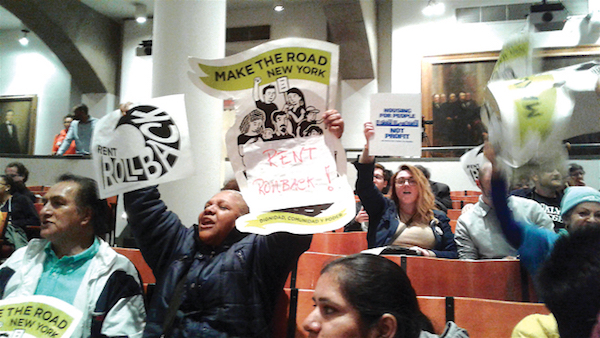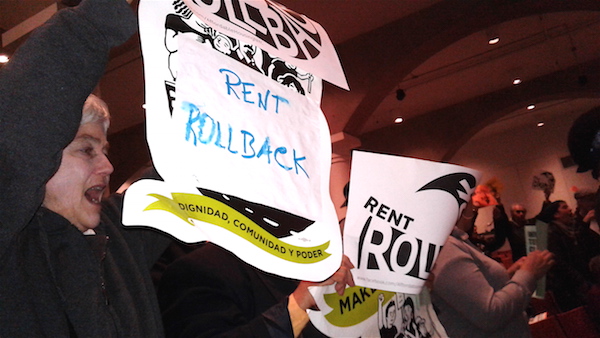
BY LINCOLN ANDERSON | There might not be a rent rollback — much less another rent freeze — coming up later this year for tenants living in New York City’s more than 1 million rent-regulated apartments.
On the evening of Tues., April 25, at The Cooper Union’s Great Hall on E. Seventh St., despite the presence of 150 tenants — both individuals and members of tenant coalitions — from around the city chanting, “Roll-back!” the Rent Guidelines Board (RGB), in its preliminary vote, approved increases of 1 percent to 3 percent for one-year lease renewals and 2 percent to 4 percent for two-year leases renewals for rent-regulated units.
The RGB recommended the same percentage increases for loft tenants.
For the past two years in a row, under Mayor Bill de Blasio, the RGB supported a zero percent increase for one-year renewals and a 2 percent hike for two-year renewals. The initial rent freeze two years ago was historic — the first time New York City had ever seen a zero increase under the current rent-regulation program, which dates back to 1943.
This year, many thought surely there would be another rent freeze, given that de Blasio is running for re-election to a second term. And many further hoped for a rollback — as in, an actual rent reduction. Landlords’ projected operating costs under former Mayor Mike Bloomberg were exaggerated — meaning the steady rent increases during those years were unjustified — according to tenant advocates; so, it was time for “a correction,” they argued, convincingly. Last year, Mayor de Blasio — who appoints all the RGB members — also had emphasized that “the data” supported a rent freeze.
There were hopes on Tuesday in the Great Hall for a rollback this time around. Yet, this year, the data was different. Last year’s calls for a rollback, in fact, seemed louder and stronger — as if tenants knew it was actually possibly within reach, based on the numbers.
“We said a rollback is what we need! We’re here to stop the landlord greed!” the tenants sang.
“Fight! Fight! Fight!” they chanted. “Housing is a right!”
“Si se puede!” (“We can do it!”)
An Upper West Side woman in the audience — a 92-year-old retired gardener — was praying for a rollback.
“I’m holding my breath,” she said. “I need it. We used to live on West End Ave. We had to leave because our building went co-op. If we had bought, we would have become millionaires.”
Last year, a drop in the cost of heating oil justified a rent freeze, in the opinion of most of the RGB members. However, oil’s price has come back up.
In short, this year, the data — landlords’ operating expenses — justify a rent increase, according to a majority of the nine-member board.
Specifically, the “price index” used to calculate owners’ operating costs justified the raise, in the opinion of most of the board members.
Harvey Epstein and Sheila Garcia, the board’s tenant members, opposed the recommended guidelines, which were put forth by Kathleen Roberts, the RGB chairperson. Also voting No on Roberts’ proposal were the two owner representatives, Mary Serafy and J. Scott Walsh, who favored boosting rents more.
But the board’s other four so-called public members all backed the suggested rent hikes — eliciting a chorus of boos from the audience.
Starting off the proposals, owner members Serafy and Walsh had advocated for steeper renewal increases — 4 percent for one-year leases and 6 percent for two-year leases.
“We believe a third straight year of a rent freeze would possibly be a disaster for a certain number of landlords,” Serafy stated. “According to the data, operating costs are up 6.2 percent. Not increasing rents this year will increase the possibility of large increases in the future.”
“Not justified! Not justified!” the tenants in the audience chanted.
All the other RGB members opposed this proposal.
Next, Garcia and Epstein made a pitch for a “two-tiered system,” under which landlords who had taken advantage of MCIs (major capital improvements) and IAIs (individual apartment improvements) and vacancy increases in the past three years would have to give their tenants a rent reduction of 4 percent to zero percent for one-year renewals or 2 percent to zero percent for two-year renewals.
If the landlords hadn’t done any of these, their units would get lease renewals in the range of zero percent to 2 percent for both one and two years, per the tenant members’ proposal.
Epstein said they had been looking at “the data,” too, but that it told them a different story.
“More than 35 percent of people pay more than 50 percent of their income toward rent,” he said. “Forty-five percent of people going into homeless shelters come from rent-stabilized housing.”
Meanwhile, he added, “Owners’ income exceeds their costs, year after year.”
Added Garcia, “We exist as a rent board because there is a homeless crisis. One hundred thousand people will be going through the shelter system this year. There are 60,000 people in the shelters — 30,000 of them are children.
“Landlords are paying 57 percent of every dollar to run their buildings — down from 68 percent a few years ago,” she added. “Tenants’ wages are stagnant. Tenants across the city are struggling, while landlords are doing just fine.”
Garcia noted that leading landlord group the Rent Stabilization Association sued to repeal the RGB’s most-recent rent freeze, but lost in State Supreme Court.
“The court ruled that the RGB can take into account affordability,” she noted.
However, all seven other RGB members opposed Epstein and Garcia’s motion.
“Shame! Shame! Shame!” came shouts from the audience — along with a long, loud hiss clearly meant to sound like a snake to show that the tenants felt the so-called “public members” had betrayed them.
Then Roberts put forth her winning proposal, which passed by a vote of 5 to 4.
“We need a revolution,” one woman in the audience grumbled to other tenants around her.

Speaking after the vote, Epstein said there won’t be a rent freeze or rollback for lease renewals starting this October because the final figures must be “in the range” that the RGB proposed Tuesday night in its preliminary vote.
However, veteran tenant activist Michael McKee, of Tenants Political Action Committee, said there’s nothing in the law that says that must be the case.
“Not at all true,” McKee said. “While the RGB has never adopted final rent adjustments that were higher or lower than the ranges, there is no prohibition against their doing so. ‘Ranges’ are nowhere mentioned in the law or the regulations. The ‘range’ methodology was adopted by the former Bloomberg RGB chairperson, Marvin Markus, as a means of tamping down tenant protest — don’t put out an actual preliminary number, keep people off-base.”
However, told of McKee’s response, Epstein said, the city’s Law Department — the Corporation Counsel — this year is saying they, in fact, must stay “in the range.”
“Corp Counsel told us specifically this year that the votes need to be within the range,” Epstein said. “I totally hear what Mike is saying and I think he’s right about what he’s saying about the statute. But there’s all these administrative-procedure act things and Corp Counsel says now that we have to be within the range.”
Epstein — a former chairperson of the East Village’s Community Board 3 — said he was “disappointed” there will be no rent freeze, much less a rollback.
“We think the data really supported it,” he reiterated. “I think the board really ignored the data.”
However, Helen Schaub, a public member on the RGB, when asked how the board could have backed a rent freeze for two years, yet now supports an increase, also cited the data.
“The data is different than last year,” she said.
She said a breakdown of the price index of landlords’ operating costs done by RGB staff is all clearly spelled out on the RGB website (nycrgb.org).
“The price index was negative for two years,” but not this year, she noted.
Asked if the board felt that rent increases during the Bloomberg years that were “rubber-stamped” by the RGB — based on exaggerated cost projections, according to advocates — have been corrected by a couple of years of rent freezes, she said, “I think it is.”
Joseph Strasburg, president of the Rent Stabilization Association (RSA), predicted — unhappily — that, by the end of this current process, tenant advocates would succeed in driving down the rent increases as far as possible.
“In June, we believe there will only be 1 percent and 2 percent increases,” he said.
Yet, landlords continue to face increasing New York City real estate taxes, he said.
The RSA’s landlord members represent about half of the city’s 1.2 rent-stabilized apartments.
Regarding their lawsuit challenging last year’s rent freeze, Strasburg said his group strongly disagrees with the basis of the judge’s ruling — mainly, that affordability should be considered by the RGB when it sets rents.
“Affordability was not even mentioned in the [original rent-regulation] statutes,” he said. “Now a Supreme Court judge says affordability is the main criterion.”
However, given that this year’s price index is actually up — by 6.2 percent — but the RGB’s rent-increase recommendations are only about half that amount, Strasburg indicated the RSA might sue again.
“We may find that this year is a better lawsuit for us,” he said.
There will be five public hearings throughout the boroughs to gather input on the proposed rent increases. Two Manhattan public meetings will be held in the Downtown area: Thurs., May 25, at the Landmarks Preservation Commission’s ninth-floor conference room, at 1 Centre St., at 9:30 a.m., and Wed., June 14, at the US Customs House, at 1 Bowling Green, from 2 p.m. to 8 p.m.
The RGB will hold its final vote on Tues., June 27, at Baruch College’s Mason Hall, at 17 Lexington Ave., at E. 23rd St., at 7 p.m.































